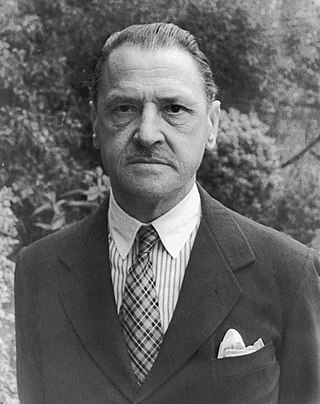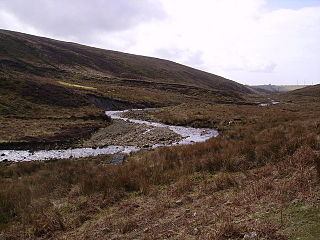
William Somerset Maugham was an English writer, known for his plays, novels and short stories. Born in Paris, where he spent his first ten years, Maugham was schooled in England and went to a German university. He became a medical student in London and qualified as a physician in 1897. He never practised medicine, and became a full-time writer. His first novel, Liza of Lambeth (1897), a study of life in the slums, attracted attention, but it was as a playwright that he first achieved national celebrity. By 1908 he had four plays running at once in the West End of London. He wrote his 32nd and last play in 1933, after which he abandoned the theatre and concentrated on novels and short stories.

Alexander Whitelaw Robertson Trocchi was a Scottish novelist.

Ian Lancaster Fleming was an English writer, best known for his postwar James Bond series of spy novels. Fleming came from a wealthy family connected to the merchant bank Robert Fleming & Co., and his father was the Member of Parliament (MP) for Henley from 1910 until his death on the Western Front in 1917. Educated at Eton, Sandhurst, and, briefly, the universities of Munich and Geneva, Fleming moved through several jobs before he started writing.

Welsh writing in English, is a term used to describe works written in the English language by Welsh writers.

Angus Lindsay Ritchie Calder was a Scottish writer, historian, and poet. Initially studying English literature, he became increasingly interested in political history and wrote a landmark study on Britain during the Second World War in 1969 entitled The People's War. He subsequently wrote several other historical works but became increasingly interested in literature and poetry and worked primarily as a writer, though often holding a number of university teaching positions. A socialist, he was a prominent Scottish public intellectual during the 1970s and 1980s.

John Cowper Powys was an English novelist, philosopher, lecturer, critic and poet born in Shirley, Derbyshire, where his father was vicar of the parish church in 1871–1879. Powys appeared with a volume of verse in 1896 and a first novel in 1915, but gained success only with his novel Wolf Solent in 1929. He has been seen as a successor to Thomas Hardy, and Wolf Solent, A Glastonbury Romance (1932), Weymouth Sands (1934), and Maiden Castle (1936) have been called his Wessex novels. As with Hardy, landscape is important to his works. So is elemental philosophy in his characters' lives. In 1934 he published an autobiography. His itinerant lectures were a success in England and in 1905–1930 in the United States, where he wrote many of his novels and had several first published. He moved to Dorset, England, in 1934 with a US partner, Phyllis Playter. In 1935 they moved to Corwen, Merionethshire, Wales, where he set two novels, and in 1955 to Blaenau Ffestiniog, where he died in 1963.
British literature is from the United Kingdom of Great Britain and Northern Ireland, the Isle of Man, and the Channel Islands. This article covers British literature in the English language. Anglo-Saxon literature is included, and there is some discussion of Latin and Anglo-Norman literature, where literature in these languages relate to the early development of the English language and literature. There is also some brief discussion of major figures who wrote in Scots, but the main discussion is in the various Scottish literature articles.

Erich Fried was an Austrian-born poet, writer, and translator. He initially became known to a broader public in both Germany and Austria for his political poetry, and later for his love poems. As a writer, he mostly wrote plays and short novels. He also translated works by different English writers from English into German, most notably works by William Shakespeare.

Simon Vestdijk was a Dutch writer.
Peter Ritchie Ritchie-Calder, Baron Ritchie-Calder, was a Scottish socialist writer, journalist and academic.
John Mackenzie Calder was a Scottish-Canadian writer and publisher who founded the company Calder Publishing in 1949.

The River Calder is a 13-mile (21 km) long river that is one of the main tributaries of the River Wyre in Lancashire, England. Like the other rivers in England with the name Calder, its name is thought to derive from a mixture of Old Welsh and Old British words meaning "hard and violent water or stream".

The cinema of Wales comprises the art of film and creative movies made in Wales or by Welsh filmmakers either locally or abroad. Welsh cinema began in the late-19th century, led by Welsh-based director William Haggar. Wales continued to produce film of varying quality throughout the 20th century, in both the Welsh and English languages, though indigenous production was curtailed through a lack of infrastructure and finance, which prevented the growth of the industry nationally. Despite this, Wales has been represented in all fields of the film making process, producing actors and directors of note.
Proletarian literature refers here to the literature created by left-wing writers mainly for the class-conscious proletariat. Though the Encyclopædia Britannica states that because it "is essentially an intended device of revolution", it is therefore often published by the Communist Party or left-wing sympathizers, the proletarian novel has also been categorized without any emphasis on revolution, as a novel "about the working classes and working-class life; perhaps with the intention of making propaganda". This different emphasis may reflect a difference between Russian, American and other traditions of working-class writing, with that of Britain. The British tradition was not especially inspired by the Communist Party, but had its roots in the Chartist movement, and socialism, amongst others. Furthermore, writing about the British working-class writers, H Gustav Klaus, in The Socialist Novel: Towards the Recovery of a Tradition (1982) suggested that "the once current [term] 'proletarian' is, internationally, on the retreat, while the competing concepts of 'working-class' and 'socialist' continue to command about equal adherence".
Calder Publications is a publisher of books. Since 1949, the company has published many books on all the arts, particularly subjects such as opera and painting, the theatre and critical and philosophical theory. Calder's authors have achieved nineteen Nobel Literature Prizes and three for Peace.
Hilda Campbell Vaughan was a Welsh novelist and short story writer writing in English. Her ten varied novels, set mostly in her native Radnorshire, concern rural communities and heroines. Her first novel was The Battle to the Weak (1925), her last The Candle and the Light (1954). She was married to the writer Charles Langbridge Morgan, who had an influence on her writings. Although favourably received by her contemporaries, Vaughan's works later received minimal attention. Rediscovery began in the 1980s and 1990s, along with a renewed interest in Welsh literature in English as a whole.
English literature is literature written in the English language from the English-speaking world. The English language has developed over more than 1,400 years. The earliest forms of English, a set of Anglo-Frisian dialects brought to Great Britain by Anglo-Saxon settlers in the fifth century, are called Old English. Beowulf is the most famous work in Old English. Despite being set in Scandinavia, it has achieved national epic status in England. However, following the Norman conquest of England in 1066, the written form of the Anglo-Saxon language became less common. Under the influence of the new aristocracy, French became the standard language of courts, parliament, and polite society. The English spoken after the Normans came is known as Middle English. This form of English lasted until the 1470s, when the Chancery Standard, a London-based form of English, became widespread. Geoffrey Chaucer (1343–1400), author of The Canterbury Tales, was a significant figure developing the legitimacy of vernacular Middle English at a time when the dominant literary languages in England were still French and Latin. The invention of the printing press by Johannes Gutenberg in 1439 also helped to standardise the language, as did the King James Bible (1611), and the Great Vowel Shift.

Welsh-language literature has been produced continuously since the emergence of Welsh from Brythonic as a distinct language in around the 5th century AD. The earliest Welsh literature was poetry, which was extremely intricate in form from its earliest known examples, a tradition sustained today. Poetry was followed by the first British prose literature in the 11th century. Welsh-language literature has repeatedly played a major part in the self-assertion of Wales and its people. It continues to be held in the highest regard, as evidenced by the size and enthusiasm of the audiences attending the annual National Eisteddfod of Wales, probably the largest amateur arts festival in Europe, which crowns the literary prize winners in a dignified ceremony.
Arthur Calder-Marshall was an English novelist, essayist, critic, memoirist, and biographer.
Alan Burns was an English author and one of the key figures in the short-lived group of experimental writers working in Britain in the 1960s and early 1970s, which included writers such as B. S. Johnson, Christine Brooke-Rose, Ann Quin and Giles Gordon. Burns wrote eight novels, a play and the script for two short films, as well as several short pieces, a book of interviews with writers, articles and edited an American report on pornography and censorship for publication in the UK. Burns was one of the earliest teachers of creative writing as an academic discipline in Britain, appointed as the first writer in residence on the University of East Anglia's Creative Writing Master's programme and later he went on to teach this discipline in both Australia and the USA. Burns also worked with Peter Whitehead, writing Jeanette Cochrane, a short experimental film in a montage style, which featured early music from Pink Floyd and an appearance by Nico.









